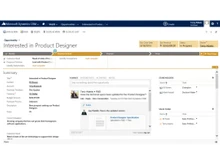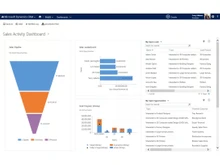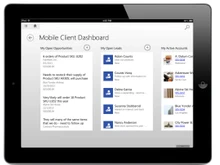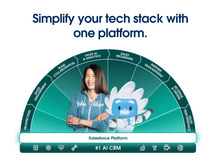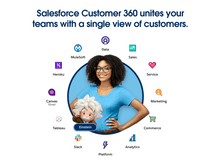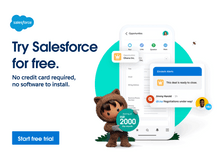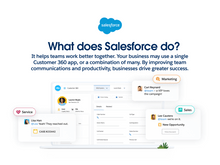For businesses already part of the Microsoft ecosystem, Microsoft Dynamics CRM is the best choice. This complete solution interfaces well with Microsoft products like Office 365 and Azure. It provides extensive customisation, AI capabilities through Microsoft's Power Platform, and automation tools with Power Automate.
Conversely, Salesforce CRM is a cloud-native solution. It is popular for its huge app marketplace (AppExchange), scalability, and broad feature set. Its extensive range of integrations and AI-powered insights with Salesforce Einstein make it a great option for businesses of all sizes.
To assist you in making an informed choice, we will examine the main distinctions between Microsoft Dynamics CRM and Salesforce CRM in this comparison.
Here is a tabular overview of Microsoft Dynamics CRM and Salesforce CRM before we further compare.
| Best CRM Software for Businesses |
| Features |
Microsoft Dynamics CRM |
Salesforce CRM |
| Trial |
30-day free trial |
30-day free trial |
| Starting Price |
$65 /month |
$25 /month |
| Integration |
1,000+ integrations |
3,000+ integrations |
| Target Audience |
Medium to large enterprises |
Small to large enterprises |
| Core Functionalities |
Sales, marketing automation, customer service, field service |
Sales, marketing, customer service, AI, automation |
| AI Capabilities |
Power AI (Power Platform) |
Salesforce Einstein AI |
| Mobile App |
iOS, Android |
iOS, Android |
| Offline Mode |
Available |
Available in mobile app |
| Customer Support |
Phone, email, community forums |
Phone, email, live chat, community forums |
| Reviews |
Microsoft Dynamics CRM Reviews |
Salesforce CRM Reviews |
Microsoft Dynamics CRM vs Salesforce CRM: In Terms of Features
- Customisation: With AppExchange, Salesforce CRM excels at enabling businesses to adapt the CRM to almost any requirement. Additionally, it offers low-code alternatives for creating unique workflows. However, Microsoft Dynamics CRM provides extensive customisation, particularly for businesses that already use Microsoft products. Its third-party app options are more limited than Salesforce's extensive marketplace.
- AI Capabilities: Salesforce's AI-powered Salesforce Einstein is a leader in AI capabilities. It offers lead scoring, automated data input, predictive analytics, and insights into customer behaviour. Because of this, Salesforce CRM is a very smart tool for forecasting and making decisions about sales. Through the Power Platform (Power BI, Power Automate, and Power Virtual Agents), Microsoft Dynamics CRM incorporates AI. It enables companies to create custom AI models.
- Sales & Marketing Automation: Salesforce CRM is a leader in sales and marketing automation. It offers advanced workflow automation, social media and advertising platform connections, and thorough segmentation. Salesforce's marketing automation tools are more comprehensive and better suited for lead nurturing and complex sales workflows. Whereas, Microsoft Dynamics CRM also offers automation capabilities, especially with the Microsoft Power Automattool.
- User Experience: Salesforce CRM offers a sleek, contemporary user experience that can be tailored to any user's requirements. It offers record views, dashboards, and reports that are flexible enough to accommodate a range of business needs. Because of its stronger interaction with other Microsoft services, Microsoft Dynamics CRM can feel more complicated even if it is incredibly functional.
- Collaboration Features: Microsoft Dynamics CRM is perfect for businesses that already use Office 365 and Microsoft Teams for collaboration. Teams can work together easily within the same interface because of this close connection. Chatter, a collaboration tool provided by Salesforce CRM, enables users to have direct conversations, and exchange documents and updates.
- Ticketing System and Training: Case management, ticketing, and knowledge bases are just a few of the robust customer care features offered by both platforms. Salesforce shines with its Service Cloud, which offers features like omnichannel assistance and chatbots powered by AI. Similar tools are provided by Microsoft Dynamics CRM. Although it connects better with backend systems, particularly if the company employs Microsoft's ERP solutions for all of its business operations.
Microsoft Dynamics CRM & Salesforce CRM: Integrations
Salesforce CRM offers over 3,000 integrations through AppExchange. Among these are native connectors with well-known third-party applications like LinkedIn, Mailchimp, and Google Workspace.
Whereas Microsoft Dynamics CRM is a tool for businesses that currently use Office 365, Outlook, SharePoint, and Azure. Salesforce CRM is the best option for companies that need specialised capabilities. Because it offers a wider variety of third-party interfaces than Dynamics CRM, which has more than 1,000 integrations.
Microsoft Dynamics CRM or Salesforce CRM: Implementation
Microsoft products like Office 365 and Azure are already integrated into the Dynamics CRM system. As a result of which the adoption of Microsoft Dynamics CRM is easiest for businesses that currently use them. For people accustomed to Microsoft's surroundings, its deployment can be completed quickly, but complex customisations can require more work.
However, Salesforce CRM is simpler for businesses that prioritise customer-facing tasks to implement. Setting it up might take a lot of effort, especially for large businesses that demand advanced functionality. Professional services are available from both CRMs to help with deployment.
Microsoft Dynamics CRM vs Salesforce CRM: Pricing
The Sales Professional plan of Microsoft Dynamics CRM, which comes with basic reporting and sales automation, starts at $65 per user per month. As more features, such as advanced analytics, reporting, forecasting and customer support capabilities, are introduced, the cost of plans rises.
The Essentials plan of Salesforce CRM costs $25 per user each month, while the more expensive Sales Cloud and Service Cloud options can cost significantly more. Salesforce offers extremely scalable and feature-rich solutions, despite the fact that it can get pricey. Despite having comparable prices, Microsoft Dynamics CRM is frequently thought to be a better option.
Microsoft Dynamics CRM and Salesforce CRM: Support
Customer service is available by phone, email, and community forums for Microsoft Dynamics CRM. Additional support options, such as technical assistance and dedicated account managers, are available to users of the premium programs.
In contrast, Salesforce CRM provides live chat, email, and phone support around the clock, with varying service levels depending on the subscription package. Both systems offer community resources and documentation. Salesforce's support system is thought to be more reliable and responsive, particularly for larger businesses.
Verdict: Microsoft Dynamics CRM vs Salesforce CRM
Depending on your company's requirements and current infrastructure, you can choose between Salesforce CRM and Microsoft Dynamics CRM.
With its robust ERP features and smooth integration, Microsoft Dynamics CRM is a great option for companies who already use Microsoft products. Large businesses looking for deep integration between CRM and other operations will find it suitable.
Conversely, Salesforce CRM is ideal for businesses that value a customer-centric strategy. Its robust AI features, automation, and vast app ecosystem make Salesforce the better choice for growing businesses in need of scalability and flexibility.
In the end, both CRMs are robust. However, Microsoft Dynamics CRM performs better in integrating with business workflows, while Salesforce tends to perform better in terms of features and scalability.


 5 Ratings & 1 Reviews
5 Ratings & 1 Reviews






